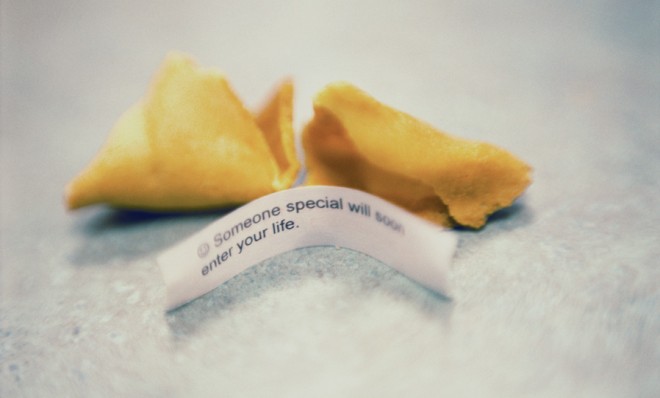How do fortune cookie messages get written?
Two of the world's largest producers of baked-in aphorisms don't even have someone on the payroll dedicated to full-time fortune writing

A free daily email with the biggest news stories of the day – and the best features from TheWeek.com
You are now subscribed
Your newsletter sign-up was successful
People often take fortune cookie messages to heart. They crack open the yellow crescent moon cookies that conclude their Chinese restaurant meal, and eagerly hunt for predictions, revelations, and deeper meaning. Many save their favorites, carrying them around in a wallet.
But these often-odd messages are not axioms from the beyond. The epigrams originate in a handful of factories that each churn out upward of 4 million little slips of wisdom a day.
Wonton Food, Inc. is the world's largest manufacturer of fortune cookies and fortune cookie messages. It was established in 1973 and is based in the New York City area, with an additional factory in Houston. Wonton Food ships between 4.5 million and 5 million cookies per day to restaurants and chains throughout the U.S. and to Canada, Latin America, and Europe.
The Week
Escape your echo chamber. Get the facts behind the news, plus analysis from multiple perspectives.

Sign up for The Week's Free Newsletters
From our morning news briefing to a weekly Good News Newsletter, get the best of The Week delivered directly to your inbox.
From our morning news briefing to a weekly Good News Newsletter, get the best of The Week delivered directly to your inbox.
Yang's Fortunes, Inc., founded in 1996 and based in San Francisco, just handles printing, cutting, and packaging fortunes to send off to clients baking them into cookies. Yang's churns out about 4 million fortunes per day.
Fortune cookies are conspicuously absent from restaurants in China. But in the Westernized version of Chinese dining, the treats are expected at the end of every Chinese restaurant meal, or included in a take-out order. The founders of Wonton Food and Yang's Fortunes both started off focused on other Chinese cuisine products. But each recognized the growing demand for fortune cookies and their baked-in aphorisms, and capitalized on it.
In 2005, The New Yorker profiled Donald Lau, who at the time was vice president of Wonton Food, Inc. and the person writing the fortunes. Lau scribbled off fortunes in between his other duties, gleaning inspiration from wherever he could find it — like signs in the subway, as The New Yorker recounts. Since then, the company has brought on freelance writers to supplement Lau's output of adages.
Lisa Yang, vice president of Yang's Fortunes and daughter of founder Steven Yang, fell into writing fortunes, as well. When her father expanded into printing fortunes, he hired a writer to translate Chinese proverbs. Because cultural context was lost in translation, they often ended up nonsensical. Lisa Yang would edit them in her free time. In college, she spent a lot of time writing and rewriting the fortunes, even when her father hired a writer and a teacher to assist with the duty. Lisa Yang would read books of quotes for inspiration, and peruse daily horoscopes to get in the mindset to create new messages.
A free daily email with the biggest news stories of the day – and the best features from TheWeek.com
Yang joined her family's company full-time in 2005, after graduating college. Today, the company has a database of about 5,000 fortunes, and no one on the payroll dedicated to producing new ones. Still, Yang will sometimes add fortunes if the mood moves her. She admits spending nights from time to time sifting through blogs dedicated to fortune cookies. "I think it's fun being the person behind this," she told me. "Fortune cookies are such a part of our lives. Even when I go to Chinese restaurant I always share my fortune out loud with friends. We always want to know what the other one has."
Fortunes also are tweaked based on client feedback. "You will meet a tall, dark stranger" was removed from circulation when people complained they found it sinister.
Wonton Food contracts freelance writers once every couple years to craft new messages for the company's database of about 15,000 fortunes. "We understand opening a fortune cookie is an exciting moment, so that is why we renew our database — to create exciting moments for people," says Danny Zeng, vice president of sales. One of the last such attempts to spice up messages was earlier this year, when the generally vague, sunny messages got a bit racier with quips like "The evening promises romantic interest" or "Romance and travel go together." The company did get some complaints about children receiving such sayings. "We want to create excitement, but not offend," Zeng says.
Yang finds that people are often surprised to learn she and her family are behind many of the fortune cookies they receive, and they often pull out the favorites from their wallet to show her. And if knowing the business origins of treasured, seemingly omniscient fortune cookie messages brings them disappointingly back to earth, they can at least still hang onto the belief that the cosmos conspired to land a particular cookie in their hands.
Karina Martinez-Carter is an assistant editor at Map Happy and a freelance journalist based in Buenos Aires, Argentina. Her work has appeared with BBC Capital, BBC Travel, Thrillist and Quartz, among other publications.